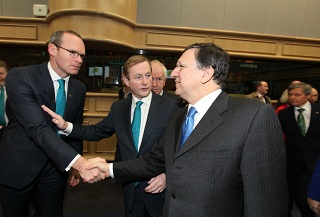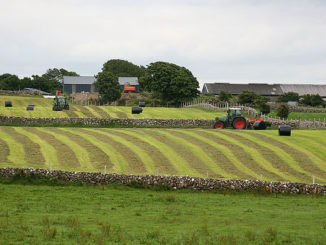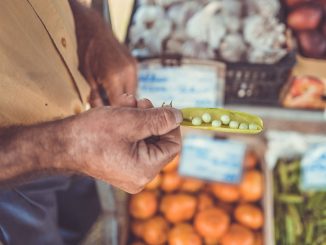The EU roadshow descended upon Dublin this week, as Ireland’s six month presidency of the Council of the European Union began in earnest. European Council President Herman Van Rompuy as well as the College of Commissioners, led by Commission President José Manuel Barroso, all arrived in Dublin Castle to discuss the Presidency programme.

Priorities for the Irish presidency are “stability, growth and jobs”, though managing the CAP negotiations, due to conclude by the end of the Irish presidency in June, is also crucial. To maintain this timeline, EU and CAP budgets will need to be agreed within two months, while the European Council of Ministers and the EU Parliament will need to first establish their own positions and then reach an agreement.
The Irish Department of Agriculture, Food and the Marine is headed by the youthful and energetic Minister Simon Coveney, holder of a BSc in Agriculture and Land Management, who will chair key CAP negotiations between EU Ministers. Coveney, tipped as a possible future leader of the largest party in government, Fine Gael, has been on a sometimes controversial globe trotting mission to grow exports for the Irish agri-food sector.
He has been gung-ho in helping to develop export markets, especially for the Irish dairy sector, which is earmarked to grow by 50% by 2020. Coveney described the opening of a dairy processing factory in 2012 by Kerry Group, Ireland’s largest agri-food company, as “phenomenal” and “perhaps the most significant investment ever in the Irish Agri Food industry”. He also embarked on what he described as the largest ever Irish trade emission, to China last year, a country seen as having massive potential to grow Irish exports.
Irish food and drink exports are 28% higher now than in 2009, and have passed the 9billion Euro mark. Crucially, the agri-food sector accounts for 1/3 of all net foreign earnings – that’s revenue from abroad that comes onto the island. This differs radically from other growth areas, such as the tax shy ICT and also the pharmaceuticals sectors.
So the stakes are certainly high, and the focus for Coveney and his political party Fine Gael is, and has always been, increasing productivity in all agri-food sectors, especially beef and dairy. Fine Gael are seen as representing the interests of the bigger, wealthier farmers in the parts of Ireland with the best land. Dairy farmers are, by a considerable distance, the wealthiest sector in Irish farming, with family farm incomes approaching E70,000.
Balancing Ireland’s clean green image with spearheading a massive drive towards increasing milk and meat production will be difficult for the Irish government: already agri-food makes up about 1/3 of Ireland’s Green House Gas emissions, with no signs of any significant reduction in the near future.
And balancing national interests with the more neutral role of chairing the EU Council of Agriculture Ministers will also be a challenge for the Minister who has come a long way since being expelled from a private school as a hard-partying teenager.






1 Trackback / Pingback
Comments are closed.